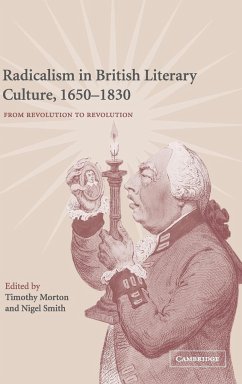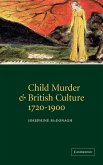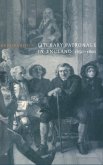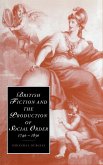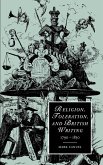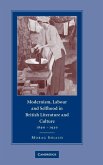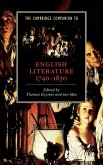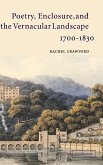Timothy Morton / Nigel Smith (eds.)
Radicalism in British Literary Culture, 1650-1830
Herausgeber: Morton, Timothy; Smith, Nigel
Timothy Morton / Nigel Smith (eds.)
Radicalism in British Literary Culture, 1650-1830
Herausgeber: Morton, Timothy; Smith, Nigel
- Gebundenes Buch
- Merkliste
- Auf die Merkliste
- Bewerten Bewerten
- Teilen
- Produkt teilen
- Produkterinnerung
- Produkterinnerung
This book examines radical tradition in British literary culture from the English Revolution to the French Revolution.
Andere Kunden interessierten sich auch für
![Child Murder and British Culture, 1720 1900 Child Murder and British Culture, 1720 1900]() Josephine McdonaghChild Murder and British Culture, 1720 190069,99 €
Josephine McdonaghChild Murder and British Culture, 1720 190069,99 €![Literary Patronage in England, 1650-1800 Literary Patronage in England, 1650-1800]() Dustin GriffinLiterary Patronage in England, 1650-1800104,99 €
Dustin GriffinLiterary Patronage in England, 1650-1800104,99 €![British Fiction and the Production of Social Order, 1740-1830 British Fiction and the Production of Social Order, 1740-1830]() Miranda J. BurgessBritish Fiction and the Production of Social Order, 1740-183074,99 €
Miranda J. BurgessBritish Fiction and the Production of Social Order, 1740-183074,99 €![Religion, Toleration, and British Writing, 1790 1830 Religion, Toleration, and British Writing, 1790 1830]() Mark CanuelReligion, Toleration, and British Writing, 1790 183079,99 €
Mark CanuelReligion, Toleration, and British Writing, 1790 183079,99 €![Modernism, Labour and Selfhood in British Literature and Culture, 1890-1930 Modernism, Labour and Selfhood in British Literature and Culture, 1890-1930]() Morag ShiachModernism, Labour and Selfhood in British Literature and Culture, 1890-1930104,99 €
Morag ShiachModernism, Labour and Selfhood in British Literature and Culture, 1890-1930104,99 €![The Cambridge Companion to English Literature, 1740 1830 The Cambridge Companion to English Literature, 1740 1830]() Thomas Keymer / Jon Mee (eds.)The Cambridge Companion to English Literature, 1740 183078,99 €
Thomas Keymer / Jon Mee (eds.)The Cambridge Companion to English Literature, 1740 183078,99 €![Poetry, Enclosure, and the Vernacular Landscape, 1700-1830 Poetry, Enclosure, and the Vernacular Landscape, 1700-1830]() Rachel CrawfordPoetry, Enclosure, and the Vernacular Landscape, 1700-183069,99 €
Rachel CrawfordPoetry, Enclosure, and the Vernacular Landscape, 1700-183069,99 €-
-
-
This book examines radical tradition in British literary culture from the English Revolution to the French Revolution.
Hinweis: Dieser Artikel kann nur an eine deutsche Lieferadresse ausgeliefert werden.
Hinweis: Dieser Artikel kann nur an eine deutsche Lieferadresse ausgeliefert werden.
Produktdetails
- Produktdetails
- Verlag: Cambridge University Press
- Seitenzahl: 296
- Erscheinungstermin: 1. Dezember 2015
- Englisch
- Abmessung: 235mm x 157mm x 22mm
- Gewicht: 634g
- ISBN-13: 9780521642156
- ISBN-10: 0521642159
- Artikelnr.: 29339191
- Herstellerkennzeichnung
- Libri GmbH
- Europaallee 1
- 36244 Bad Hersfeld
- gpsr@libri.de
- Verlag: Cambridge University Press
- Seitenzahl: 296
- Erscheinungstermin: 1. Dezember 2015
- Englisch
- Abmessung: 235mm x 157mm x 22mm
- Gewicht: 634g
- ISBN-13: 9780521642156
- ISBN-10: 0521642159
- Artikelnr.: 29339191
- Herstellerkennzeichnung
- Libri GmbH
- Europaallee 1
- 36244 Bad Hersfeld
- gpsr@libri.de
Timothy Morton is Associate Professor of English at the University of Colorado in Boulder. He is the Author of Shelley and the Revolution in Taste (Cambridge, 1995), and The Poetics of Spice (Cambridge, 2000).
List of illustrations; Notes on contributors; Acknowledgements;
Introduction Timothy Morton and Nigel Smith; Part I. From Revolution: 1.
'May the last king be strangled in the bowels of the last priest':
irreligion and the English Enlightenment, 1649-1789 Justin Champion; 2.
Radicalism and replication Nigel Smith; 3. The plantation of wrath Timothy
Morton; 4. They became what they beheld: theodicy and regeneration in
Milton, Law and Blake Donald John; 5. Fasting women: the significance of
gender and bodies in radical religion and politics, 1650-1813 Jane Shaw;
Part II. To Revolution: 6. John Thelwall and the revolution of 1649 Michael
Scrivener; 7. Women's private reading and political action, 1649-1838
Charlotte Sussman; 8. The strange career of Richard 'Citizen' Lee: poetry,
popular radicalism, and enthusiasm in the 1790s Jon Mee; 9. William
Cobbett, John Clare, and the agrarian politics of the English revolution
James McKusick; 10. 'Not a reforming patriot but an ambitious tyrant':
representations of Cromwell and the English republic in the late eighteenth
and early nineteenth centuries Peter Kitson; 11. The republican prompt:
connections in English radical culture Paul Hamilton.
Introduction Timothy Morton and Nigel Smith; Part I. From Revolution: 1.
'May the last king be strangled in the bowels of the last priest':
irreligion and the English Enlightenment, 1649-1789 Justin Champion; 2.
Radicalism and replication Nigel Smith; 3. The plantation of wrath Timothy
Morton; 4. They became what they beheld: theodicy and regeneration in
Milton, Law and Blake Donald John; 5. Fasting women: the significance of
gender and bodies in radical religion and politics, 1650-1813 Jane Shaw;
Part II. To Revolution: 6. John Thelwall and the revolution of 1649 Michael
Scrivener; 7. Women's private reading and political action, 1649-1838
Charlotte Sussman; 8. The strange career of Richard 'Citizen' Lee: poetry,
popular radicalism, and enthusiasm in the 1790s Jon Mee; 9. William
Cobbett, John Clare, and the agrarian politics of the English revolution
James McKusick; 10. 'Not a reforming patriot but an ambitious tyrant':
representations of Cromwell and the English republic in the late eighteenth
and early nineteenth centuries Peter Kitson; 11. The republican prompt:
connections in English radical culture Paul Hamilton.
List of illustrations; Notes on contributors; Acknowledgements;
Introduction Timothy Morton and Nigel Smith; Part I. From Revolution: 1.
'May the last king be strangled in the bowels of the last priest':
irreligion and the English Enlightenment, 1649-1789 Justin Champion; 2.
Radicalism and replication Nigel Smith; 3. The plantation of wrath Timothy
Morton; 4. They became what they beheld: theodicy and regeneration in
Milton, Law and Blake Donald John; 5. Fasting women: the significance of
gender and bodies in radical religion and politics, 1650-1813 Jane Shaw;
Part II. To Revolution: 6. John Thelwall and the revolution of 1649 Michael
Scrivener; 7. Women's private reading and political action, 1649-1838
Charlotte Sussman; 8. The strange career of Richard 'Citizen' Lee: poetry,
popular radicalism, and enthusiasm in the 1790s Jon Mee; 9. William
Cobbett, John Clare, and the agrarian politics of the English revolution
James McKusick; 10. 'Not a reforming patriot but an ambitious tyrant':
representations of Cromwell and the English republic in the late eighteenth
and early nineteenth centuries Peter Kitson; 11. The republican prompt:
connections in English radical culture Paul Hamilton.
Introduction Timothy Morton and Nigel Smith; Part I. From Revolution: 1.
'May the last king be strangled in the bowels of the last priest':
irreligion and the English Enlightenment, 1649-1789 Justin Champion; 2.
Radicalism and replication Nigel Smith; 3. The plantation of wrath Timothy
Morton; 4. They became what they beheld: theodicy and regeneration in
Milton, Law and Blake Donald John; 5. Fasting women: the significance of
gender and bodies in radical religion and politics, 1650-1813 Jane Shaw;
Part II. To Revolution: 6. John Thelwall and the revolution of 1649 Michael
Scrivener; 7. Women's private reading and political action, 1649-1838
Charlotte Sussman; 8. The strange career of Richard 'Citizen' Lee: poetry,
popular radicalism, and enthusiasm in the 1790s Jon Mee; 9. William
Cobbett, John Clare, and the agrarian politics of the English revolution
James McKusick; 10. 'Not a reforming patriot but an ambitious tyrant':
representations of Cromwell and the English republic in the late eighteenth
and early nineteenth centuries Peter Kitson; 11. The republican prompt:
connections in English radical culture Paul Hamilton.

